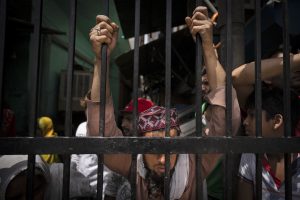As India celebrates the 75th anniversary of its independence on August 15, it is far from the equal society envisioned by its founding father, Mohandas Gandhi. Evidence is mounting that the Bharatiya Janata Party (BJP) government is encouraging some of the most flagrant anti-Muslim discrimination seen in any democracy.
Credible reports suggest that a growing number of the country’s 200 million Muslims are subject to planned and targeted threats, assault, sexual violence, and killings. Despite a grave deterioration in the protection of the human rights of India’s largest minority, the reaction from the international community so far is notable for its silence. This must change.
Two decades ago, at the International Criminal Tribunal for Rwanda, I led the team that successfully prosecuted media leaders for direct and public incitement to genocide. Though there is no comparison between the current situation in India and the 100 days of mass murder that left over 800,000 dead in Rwanda in 1994, some of the hate speech that incited that genocide is familiar to the messages delivered at the highest levels of Indian politics and society today. In some cases, it is as explicit.
In the northern state of Uttarakhand, Hindu religious leaders allied to the ruling BJP party, recently called for a “cleanliness drive” against Muslims. Sadhvi Annapurna, national president of the Akhil Bharat Hindu Mahasabha, called for the complete annihilation of India’s Muslims, saying: “If you want to eliminate their population then be ready to kill them…. If only a hundred of us become soldiers and each kills 20 lakhs (2 million) we will be victorious.”
Another leader called upon Hindus to “rape and impregnate Muslim women.” Far from being expressed in secret, these comments were made in front of large audiences and widely broadcast on mainstream and social media.
Unfortunately, these incidents are not simply the behavior of a few bad apples. They appear to be the product of prejudice filtering down into all institutions and then expressed as discriminatory legislation.
There is credible evidence to suggest that serious violations of human rights against Muslims in Uttar Pradesh and Jammu and Kashmir – murder, torture, sexual violence, unlawful imprisonment, and persecution – were committed in a systemic manner, consistent with state policy to suppress the rights of Muslims. Some acts may amount to crimes against humanity. It’s high time for the international community to act, and for an independent inquiry to be launched.
My colleagues Sonja Biserko and Marzuki Darusman and I have just compiled a comprehensive 494-page report on alleged violations against India’s Muslims since 2019, building on documentation by reputable media, academic institutions, civil society groups, and United Nations organs.
The situation is compounded by a lack of judicial redress for victims and an absence of international reaction. We suggest that there is sufficient credible evidence of massive violations taking place to move toward a formal investigative commission to establish the facts. We are concerned that Muslims in India are becoming a persecuted minority and that authorities appear to have failed to adequately address serious and pervasive claims of ill-treatment. The violence is recurring in part because of the lack of an even-handed accountability framework.
A pattern appears to be emerging where aggrieved Muslims are provoked into protesting, the protesters are punished, and the perpetrators are rarely rebuked.
In June, two ruling party officials made derogatory comments about the Prophet Mohammed during a TV debate that sparked not only unrest in several cities but a diplomatic storm in several Middle Eastern nations. The officials in question were suspended, but authorities in Uttar Pradesh targeted members of the Muslim community by charging them with having “incited” the rioting. Mass arbitrary arrests followed, along with the shocking demolition of activists’ homes by bulldozers.
Prime Minister Narendra Modi has said that Muslims are “part of our nation” with “equal rights and duties as others.” Recent legislation suggests otherwise.
The National Register of Citizens in the northeastern state of Assam risks effectively reclassifying up to 2 million ethnic Bengali Muslims as illegal immigrants from Bangladesh. There are persistent reports that Rohingya Muslims fleeing genocide in Myanmar are being pushed back to the borders they crossed to escape their tormentors. U.N. Secretary General Antonio Guterres recently warned that India’s policies risk making people stateless. Activists, journalists, and human rights defenders report state-sponsored harassment and arrests on false charges.
This corrosive atmosphere must end. Indian authorities should conduct vigorous and credible investigations into rising crimes against minorities. But if the government is unwilling or incapable of doing so, then these issues must be addressed within the United Nations framework, preferably the Human Rights Council (HRC).
The evidence our report provides is the equivalent of a preliminary examination at the International Criminal Court before the start of formal investigations. India has ratified international human rights treaties such as the Universal Covenant of Civil and Political Rights.
Human rights are not an internal issue for India but a concern of everyone. A formal HRC-mandated Commission of Inquiry could investigate all alleged violations. India would be expected to provide access for interviewing witnesses and gathering information, and the authorities would in turn be able to present evidence of its compliance with international law.
It may not cooperate but then, as we have seen with Syria, Myanmar, and North Korea, the commission could rely on abundant evidence collected through remote witness testimony and open-source investigation.
As India approaches a historic anniversary of its emergence from the shadow of colonial rule, a founding constitution that proudly promised a pluralistic state should not be trampled by rampaging sectarianism. Violations must be investigated and the responsible held to account. Not to do so is to invite further atrocities.
We have been given more than enough evidence to act. It cannot be said that we did not know.

































